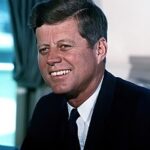Kennedy’s Vision for Global Service
President John F. Kennedy announced the Peace Corps creation on March 1, 1961, during a speech at the University of Michigan. The program emerged from Kennedy’s belief that young Americans could serve their country through international volunteer work. This initiative directly responded to Cold War tensions and America’s need for positive global engagement. 🌍
The Decision Behind the Program
Kennedy faced criticism that America only exported military power and commercial interests abroad. The Peace Corps offered an alternative approach to international relations. The program would send educated volunteers to developing nations for two-year assignments. These volunteers would work in education, healthcare, agriculture, and community development. 📊
Legislative Foundation and Launch
Congress passed the Peace Corps Act on September 22, 1961, with overwhelming bipartisan support. Kennedy appointed his brother-in-law, Sargent Shriver, as the first director. The program received initial funding of $40 million. Within months, the first volunteers departed for Ghana and Tanzania. The Peace Corps creation represented Kennedy’s commitment to public service and international cooperation. 💰
Impact:
Transforming American Diplomacy
The Peace Corps creation revolutionized how America engaged with developing nations. Over 240,000 volunteers have served in 142 countries since 1961. These volunteers built schools, improved healthcare systems, and developed agricultural programs. The program created lasting relationships between America and host communities worldwide. 🌍
Cultural Exchange and Mutual Understanding
Peace Corps volunteers became cultural ambassadors, breaking down stereotypes and misconceptions. They learned local languages, lived in rural communities, and worked alongside local populations. This grassroots diplomacy proved more effective than traditional diplomatic channels. Host countries gained valuable technical assistance while Americans developed global perspectives. The program fostered mutual respect and understanding between diverse cultures. 🤝
Long-term Legacy and Influence
The Peace Corps creation inspired similar volunteer programs worldwide. Countries like Germany, Japan, and South Korea established their own international volunteer services. Former Peace Corps volunteers became leaders in international development, diplomacy, and education. The program continues operating today, adapting to modern challenges while maintaining Kennedy’s original vision. 📈 This initiative demonstrated that idealism could drive effective foreign policy and create positive change globally.
